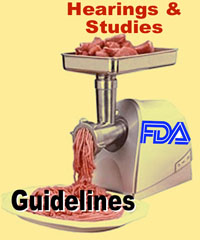Are Some DTC Print Ads Too Educational and/or Persuasive?  The FDA often describes itself as a “data-driven” agency. That’s an understatement as far as approving drugs for marketing is concerned. FDA’s Office of Prescription Drug Promotion (OPDP) also wants to rely on robust data before it issues guidelines for advertising. Consequently, it often holds public hearings to learn from experts what research may be necessary to answer its questions about the impact of direct-to-consumer (DTC) or health professional advertising.
The FDA often describes itself as a “data-driven” agency. That’s an understatement as far as approving drugs for marketing is concerned. FDA’s Office of Prescription Drug Promotion (OPDP) also wants to rely on robust data before it issues guidelines for advertising. Consequently, it often holds public hearings to learn from experts what research may be necessary to answer its questions about the impact of direct-to-consumer (DTC) or health professional advertising.
Sometimes, however, it seems that the FDA uses studies to “table” or delay issuing guidelines. See, for example, “FDA’s Proposed Web Study Will Further Delay Social Media Guidelines” and “A Cautionary Tale for Anyone Expecting FDA Social Media Guidelines Any Time Soon.”
Recently, two FDA studies were in the news: “Disease Information in Branded Promotional Material” and “Effect of Promotional Offers in Direct-to-Consumer Prescription Drug Print Advertisements on Consumer Product Perceptions.” The focus of both these studies will be on print ads.
Key takeaways and topics covered:
- Do Mixed Disease Awareness/Branded Ads Confuse Consumers?
- Disease-Awareness Ads are Less Persuasive
- New Ad Format: Mixing Disease Information and Product Promotion
- LYRICA Print Ad as a Case Study
- Benchmarking Social Media in the Pharma Industry
- Drug Ads & Coupons
- Who’s the Decider? The Patient, the Physician, or the FDA?
- PhRMA’s Comments
- FDA’s Response
The full text of this article is available to subscribers. Subscription is free.
![]()
![]()
![]()
![]() Pharma Marketing NewsEmail Addr:
Pharma Marketing NewsEmail Addr: ![]()
![]()
![]()
![]()
PMN116-04
Issue: Vol. 11, No. 6
June 29, 2012
Word Count: n/a
Find other articles in related Topic Areas:



![6 Digital Tools at the Center of Healthcare Digitalization [INFOGRAPHIC]](http://ec2-54-175-84-28.compute-1.amazonaws.com/pharma-mkting.com/wp-content/uploads/2021/04/6DigitalTools_600px-218x150.jpg)




![6 Digital Tools at the Center of Healthcare Digitalization [INFOGRAPHIC]](http://ec2-54-175-84-28.compute-1.amazonaws.com/pharma-mkting.com/wp-content/uploads/2021/04/6DigitalTools_600px-100x70.jpg)




